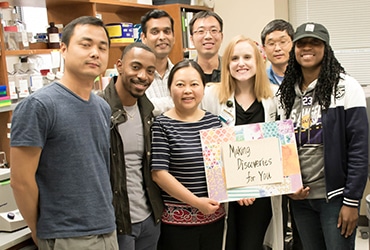Dr. Christine Lovly: Pushing Cancer Research in Multiple Ways

The AACR-Genentech BioOncology Career Development Award for Cancer Research on the HER Family Pathway encouraged and supported a physician-scientist to conduct cancer research on the HER Family Pathway and to establish a successful career path in this field. Christine M. Lovly, MD, PhD, received this award in 2015, when she was an Assistant Professor of Medicine and Cancer Biology at Vanderbilt University Medical Center. She is now Associate Professor of Medicine (Division of Hematology and Oncology), Ingram Associate Professor of Cancer Research, and Co-Leader of the Translational Research and Interventional Oncology Research Program at the Vanderbilt University Medical Center in Nashville, Tennessee.
Dr. Lovly shares how AACR support has impacted her research and career and reflects on the future of lung cancer research.
What has motivated you to pursue research on non-small cell lung cancer?
Lung cancer is the leading cause of cancer-related deaths in the US. Currently, I live in the southeastern United States, a part of the country in which lung cancer is prevalent and where outcomes from lung cancer are worse than in other areas of the country. I see the impact that lung cancer can have on individual patients and on the community. This is an area of cancer medicine that I feel very passionately about.
I was also motivated by powerful mentors, who inspired me to pursue lung cancer clinical care and research. I was fortunate to train with Drs. William Pao and David Johnson, two “giants” in the lung cancer community. These influential mentors, coupled with the fact that lung cancer is the number one cause of cancer-related deaths in the United States, made lung cancer research very near and dear to my heart.
How important to you, at that stage of your career, was the award? Did it allow you to do things you might not otherwise have done?
I received this career development award during the early phase of my career, as a junior faculty member. Successfully securing grants at this stage is incredibly impactful – enabling one to establish an independent research career, to build momentum in a specific research area, and quite frankly, to keep people in academia. I think one important way to help ensure a pipeline of academic-medical researchers is to establish funding mechanisms, such as the AACR-Genentech Career Development Award, to help people pursue their passions.
What do you consider the most important scientific advances made, at least in part, because of this AACR-Genentech Career Development award?
Support from the AACR allowed me to study EGFR Variants of Uncertain Significance in non-small cell lung cancer. The focus of my AACR-Genentech award was to understand the implications of these variants and how these variants can be targeted in the clinic to improve patient care.
We note and appreciate that you are actively involved with the AACR in different capacities. How have these service opportunities benefited your career and research?
AACR is an amazing and influential organization that helps cancer patients, cancer researchers, cancer advocates in our country and across the world, to push the momentum of cancer research forward. This is incredibly important now, more than ever, as we see the emergence of new drugs, new targets, and new technologies to detect and diagnose cancer. We must support and engage the community that is doing all this work. AACR accomplishes this goal through the organization’s advocacy efforts nationally and internationally. AACR also brings high-impact journals to fruition where we can publish and share our work and organizes multiple large meetings — bringing people together and providing important networking experiences.

It has been an incredible honor to work with the AACR in multiple capacities. I am thrilled to serve on the AACR Science Policy and Government Affairs Committee, to help ensure that a robust pipeline of funding is maintained. I also serve as Co-director of the AACR Molecular Biology in Clinical Oncology Workshop, a yearly week-long workshop for physician-scientists in training. In addition, I am a member of the Women in Cancer Research Council, and I serve on the scientific editorial board for Cancer Discovery.
AACR plays a critical role in supporting and engaging cancer researchers and pushing cancer research forward. I encourage anyone who is interested to join the organization and consider becoming part of an AACR committee. It is fun and rewarding! Our voices are welcome and much appreciated, as we all strive to advance cancer research, support our research community, and most importantly, improve outcomes for all patients touched by cancer.
Since its inception, the AACR grants program has supported basic, translational, and clinical cancer research. What areas of lung cancer research need more funding?
Overall, lung cancer research needs more funding. It is the number one cause of cancer-related deaths in the United States, yet one of the least funded types of cancer. However, many of the advances in immunotherapy and targeted therapies have emerged from lung cancer research. So, lung cancer is really informing the field overall.
Some of the areas where more basic science, clinical, and implementation research are needed include:
I. Screening and early detection – We need to continue to encourage screening and early detection. A minority of patients who are eligible for lung cancer screening are actually getting screened. We need to continue to spread the word on the importance of lung cancer screening and develop robust biomarkers to help understand risk.
II. We need to bring therapeutics, including newly developed immunotherapies and targeted therapies, into early-stage disease management. We need to understand drug mechanisms of sensitivity and resistance, across all stages of disease.
III. Importantly, we know that there are tremendous disparities in lung cancer. We need to make sure that we are addressing racial and ethnic, as well as rural versus urban disparities. We need to think about innovative ways to deliver care to patients in an equitable way, making certain that all patients have access to cutting edge therapies and diagnostics, such tumor molecular testing.
IV. Finally, while we need to expand the portfolio of clinical trials for lung cancer patients. These trials need to be coupled with robust correlative science, so that we can better understand mechanisms of drug sensitivity and resistance. We also need to rethink eligibility criteria, so that we can encompass more patients in our clinical trials. How do we make it easier for patients to enroll in clinical trials? How do we support their time in engaging with clinical trials? The work that the patient must do to be part of a clinical trial is not trivial. We collectively need to strategize on how to get more patients – and a DIVERSE group of patients – enrolled onto clinical trials.